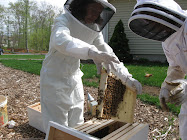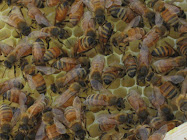There was another Providence Journal article regarding plastics yesterday. I've searched online to get a copy of the article, but after 15 minutes I can't find it. So, here are some excerpts ... as I still have the old fashioned hard copy pulled from my recycling pile here in front of me.
.
From the Providence Journal: Material from the New York Times, The Boston Globe, The Washington Post and the Associated Press was used to compile this report.
Chemical in plastics new cause for concern
Retailers move quickly to remove baby bottles containing BPA from store shelvesAre toxic plastics lurking in your kitchen?
That's the question many people are asking after reports last week that a chemical used to make baby bottles, water bottles and food containers is facing increasing scrutiny by health officials in Canada and the United States.
The substance is bisphenol-A, or BPA, widely used in the making of hard, clear and nearly unbreakable plastic called poly-carbonate. Studies and tests show that trace amounts of BPA are leaching from polycarbonate containers into foods and liquids.
Yesterday, Woonsocket-based CVS Caremark said it was joining numerous other retailers, including WalMart and Toys "R" Us, in pulling tens of thousands of products containing the chemical off its store shelves.
Nalgene, the maker of a popular sports bottle, and the baby products maker Playtex have announced they will stop using the plastic.
And last week, the Canadian government became the first country to ban BPA from use in baby bottles, a move that spurred a leading Democrat in the U.S. Senate to call for legislation that would prohibit its use in a number of everyday consumer products.
"We have immediately taken action on bisphenol-A because we believe it is our responsibility to ensure families, Canadians and our environment are not exposed to a potentially harmful chemical," Tony Clement, the minister of health, said in a statement.
BPA is used in production of polycarbonate plastic and epoxy linings to add strength and resilience to the products. U.S. manufacturers produce more than 6 billion pounds annually.
While most of the focus so far has been on products for children, the plastic is also used in food-storage containers, clear plastic pitchers used for filtered water, refillable water bottles and the lining of soft-drink and food cans.
The article goes on .... and end with statements from the American Chemistry Council's Polycarbonate / BPA Global Group and the Grocery Manufacturers Association ... basically encouraging you to go ahead and continue to buy their stuff.
.
This article from the New York Times is also good - click on link below -
.
This is an excerpt from the NYT article that I list because it contains some information that I didn't know about. Like presence of BPA in canned food and drinks. Sheesh.
From the New York Times:
What about canned food and drinks?
While much of the focus is on plastic bottles, most human exposure occurs through the lining of canned foods. Canned beverages appear to contain less of the chemical than canned foods like soup, pasta, fruits and vegetables, which are often processed at high temperatures. Virtually every canned product, even those labeled organic, has a liner with BPA. One brand, Eden Organic Baked Beans, says it uses a BPA-free can.
How do I lower my exposure?
Switch to frozen or fresh vegetables. Use glass, porcelain and stainless-steel containers, particularly for hot foods and liquids. If you don’t want to use a glass baby bottle, several companies, including the popular brand Born Free, now sell BPA-free baby bottles and sippy cups. For formula-fed babies, you can switch to powdered formula rather than liquid.
Although many plastic products claim to be microwave safe, some scientists warn against putting any plastic in the microwave. “There is such a wide variety now, from disposable containers to actual Tupperware,” says Dr. Anila Jacob, a senior scientist for the Environmental Working Group, a Washington-based advocacy group. “I don’t know of anyone who has done definitive testing of all these different types of plastic containers to see what is leaching into food.”
.
Hope this is helpful.




























